ROBERT M. PRICE




This book is dedicated to
Darrell J. Doughty
Mentor, Friend, and Colleague in the Higher Criticism
CONTENTS
Introduction
JESUS CHRIST
AS THE EFFECT OF
CHRISTIANITY,
NOT THE CAUSE
 he subject of this book is a rather abstract one. Though it deals with the very heart of the religion of a billion people, few of them even know there is an issue to discuss. For this book treats of the historical Jesus and whether we can know anything about him, whether even there is anyone to know about! Those billion Christians affirm the existence of Jesus Christ, the wonder-working man-god who died for sins and rose from the dead for them and their salvation. How do they claim to know these cherished facts? They were taught these things at their mothers' knees, or in catechism by clergymen. They would not think to question what they have thus learned, for it would seem to them the rankest disloyalty, as if one should think twice about one's patriotism. Many, however, would go beyond such pat certainty. "Bornagain" Christians, that is, evangelical pietists, filling the pews of most Protestant denominations and increasingly those of the Roman Catholic Church as well, do not rest content with believing inherited dogma. They see no advantage in taking one's religious convictions for granted this way. A faith analogous to one's ethnic background (to an extent that the two easily become synonymous) may become just as taken for granted. No, evangelical pietists insist, "God has no grandsons." One cannot inherit genuine faith but must personally opt for it. And this is what Billy Graham and his evangelistic brethren are trying to persuade people to do. Thus far, one can only applaud an apparent appeal for people to think for themselves.
he subject of this book is a rather abstract one. Though it deals with the very heart of the religion of a billion people, few of them even know there is an issue to discuss. For this book treats of the historical Jesus and whether we can know anything about him, whether even there is anyone to know about! Those billion Christians affirm the existence of Jesus Christ, the wonder-working man-god who died for sins and rose from the dead for them and their salvation. How do they claim to know these cherished facts? They were taught these things at their mothers' knees, or in catechism by clergymen. They would not think to question what they have thus learned, for it would seem to them the rankest disloyalty, as if one should think twice about one's patriotism. Many, however, would go beyond such pat certainty. "Bornagain" Christians, that is, evangelical pietists, filling the pews of most Protestant denominations and increasingly those of the Roman Catholic Church as well, do not rest content with believing inherited dogma. They see no advantage in taking one's religious convictions for granted this way. A faith analogous to one's ethnic background (to an extent that the two easily become synonymous) may become just as taken for granted. No, evangelical pietists insist, "God has no grandsons." One cannot inherit genuine faith but must personally opt for it. And this is what Billy Graham and his evangelistic brethren are trying to persuade people to do. Thus far, one can only applaud an apparent appeal for people to think for themselves.
But upon what ground is the certainty of such chosen faith, born-again faith, based? Apologists, defenders of the faith (with whose arguments I dealt at some length in a previous book, Beyond Born Again)' draw upon a great arsenal of arguments for the existence of God, the resurrection of Christ, and other major Christian tenets, but at bottom such polemics give the impression of being after-the-fact rationalizations of a position held ultimately on other, purely emotional and subjective, grounds. Faith, we are told, is "selfauthenticating." The born-again pietist tells us that for him it is not a question of debating a theoretical proposition, but rather of celebrating a "personal relationship with Christ." It would be possible to question its reality, but entirely perverse-like entertaining the theoretical possibility that one's loving spouse is really a CIA agent assigned to spy on one, as in the movie Total Recall. What are the chances?
I believe there is less here than meets the eye. Again, in Beyond Born Again, I explored the meaning and possible referents of the phrase "having a personal relationship with Jesus Christ." Here let me just pause for a moment on the issue of self-authentication or self-evidence. John Calvin claimed that the believer in Christ enjoys such subjective reassurance; he called it "the witness of the Spirit," a term derived from 1 John 5:10 ("The one who believes in the Son of God has the witness in himself"). As the old chorus puts it, "You ask me how I know he lives? He lives within my heart!" Since Christians can frequently be heard reminding one another to quiet their doubts by falling back on "the witness of the Spirit" within them, it is apparent that this witness cannot be quite as self-authenticating as it sounds! Whence arise doubts in the first place?
Dubious claims of the self-evidence of this or that point are hardly unique to religious rhetoric. Rene Descartes's whole epistemology depended upon the supposed reliability of what seemed "clear and distinct" to the rational mind. As Richard Rorty summed up the position, traditional philosophy has imagined the human mind as "the mirror of nature."' The external world and objective truth are just there, hanging in metaphysical space, as it were, and the mind is a passive receptor for this truth. The truth is supposedly self-evident. But if this is so, why do equally acute truth seekers not arrive at the same conclusions? The pre-Socratic philosophers theorized about the origin and composition of the world, but they could not agree in the absence of better data, so Socrates turned from natural philosophy, such as Thales and Anaximander had practiced, to the introspective study of human nature instead. And great was his confidence (to hear Plato tell it) that clear thinking could penetrate the secrets of human nature, morals, epistemology, and a great many other things. Yet Socrates' opinions, and Plato's after him, were hardly beyond doubt. The Skeptics were a philosophical school that anticipated modern Agnosticism in every way. They banished all reliance on what seems self-evident with one mighty blow. They merely pointed out the fact that all of us have at one time or another been absolutely certain of something-which later proved erroneous. You were wrong then; how can you be so sure you're not wrong now? Everyone knows the feeling of having a bubble popped, and thinking, "Oh yes! I never thought of that!" So much for self-evidence.
But Descartes believed what was self-evident, what was clear and distinct to the mind, had to be true. So did his fellow Rationalists Leibniz and Spinoza. And they only repeated the sad spectacle of the pre-Socratics, since their supposedly infallible cogitations did not agree. David Hume began chipping away at the certainties of the Rationalists, pointing out that while we consider many things so self-evidently true that it would be insane to doubt them, they are in fact quite unprovable. Hume doubted we could prove there is an observing self, a feeling and sensing ego, a sequence of cause and effect, and so on. All these apparent realities which we think we experience are actually mere associations of ideas whose particular linkages we infer without proof. Jacques Derrida and Richard Rorty, among others, have taken up the weapons of unblinking analysis against such naive confidence in the supposedly self-evident. Derrida aims his guns at what he calls the "Presence Metaphysics" of traditional philosophical and theological thinking. We can always find the hidden tracks on the virgin snowfield if we look hard enough. We can always find the seams in the seamless garment if our lens is sharp enough. What seems basic, tacit truth, upon closer inspection, bears the telltale marks of composition. The sublimely simple is yet the product of a hidden process of relation. Derrida points to Freudian analysis to demonstrate that even "clear and distinct" knowledge of the self is anything but. The conscious self is but a carefully edited "authorized version" provided for our own "public consumption." Perception is twisted, at least refracted, in a thousand ways. Even the bare perception of "the present moment" is not a spontaneous reception of naked phenomena, but is rather a compounding of memory's echo and imagination's anticipation. The overlap of the two results in a scripted, preinter- preted "now" moment that only seems to have emerged from the time stream perfect and full-blown like Aphrodite rising from the waves.;

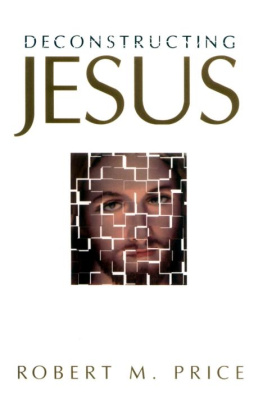
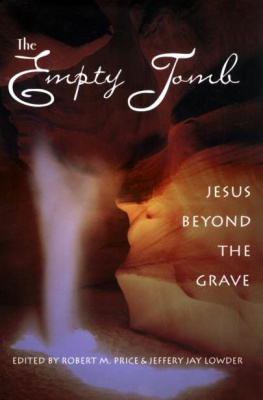
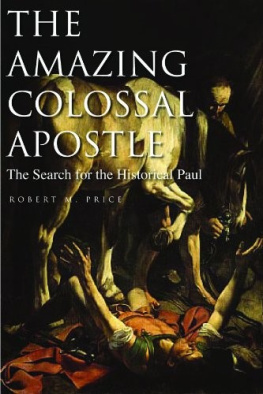
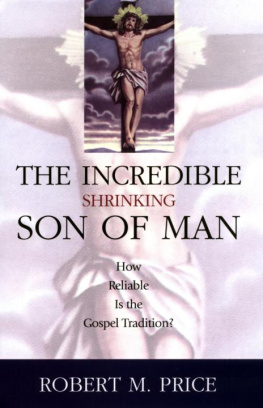
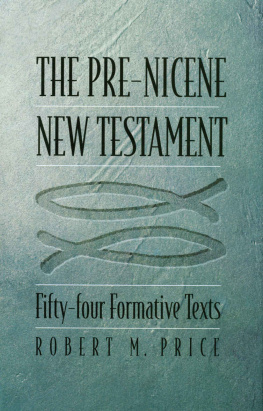
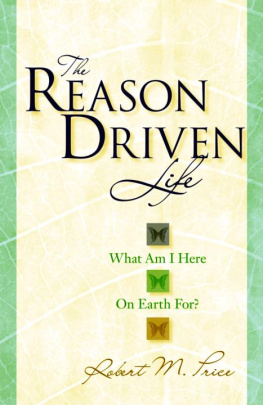
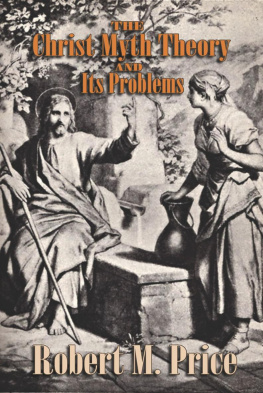

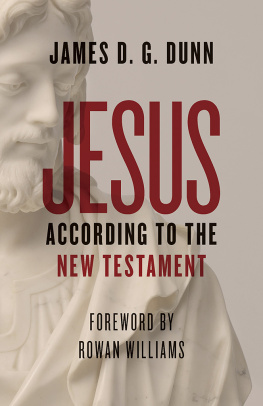
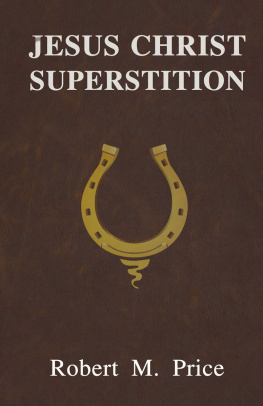

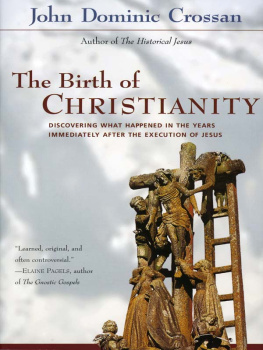
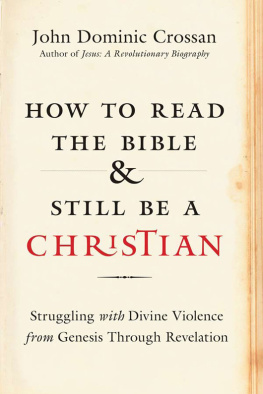
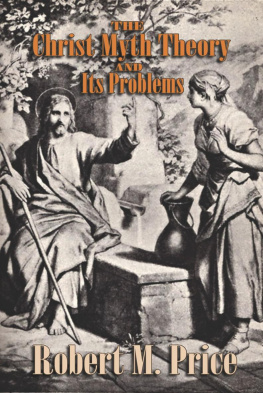
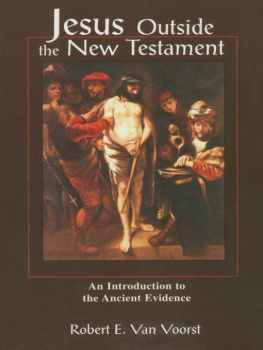

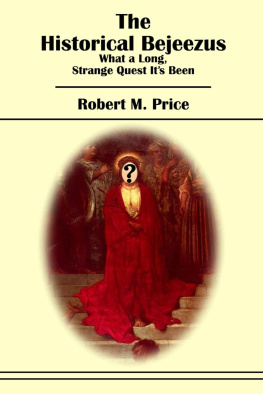




 he subject of this book is a rather abstract one. Though it deals with the very heart of the religion of a billion people, few of them even know there is an issue to discuss. For this book treats of the historical Jesus and whether we can know anything about him, whether even there is anyone to know about! Those billion Christians affirm the existence of Jesus Christ, the wonder-working man-god who died for sins and rose from the dead for them and their salvation. How do they claim to know these cherished facts? They were taught these things at their mothers' knees, or in catechism by clergymen. They would not think to question what they have thus learned, for it would seem to them the rankest disloyalty, as if one should think twice about one's patriotism. Many, however, would go beyond such pat certainty. "Bornagain" Christians, that is, evangelical pietists, filling the pews of most Protestant denominations and increasingly those of the Roman Catholic Church as well, do not rest content with believing inherited dogma. They see no advantage in taking one's religious convictions for granted this way. A faith analogous to one's ethnic background (to an extent that the two easily become synonymous) may become just as taken for granted. No, evangelical pietists insist, "God has no grandsons." One cannot inherit genuine faith but must personally opt for it. And this is what Billy Graham and his evangelistic brethren are trying to persuade people to do. Thus far, one can only applaud an apparent appeal for people to think for themselves.
he subject of this book is a rather abstract one. Though it deals with the very heart of the religion of a billion people, few of them even know there is an issue to discuss. For this book treats of the historical Jesus and whether we can know anything about him, whether even there is anyone to know about! Those billion Christians affirm the existence of Jesus Christ, the wonder-working man-god who died for sins and rose from the dead for them and their salvation. How do they claim to know these cherished facts? They were taught these things at their mothers' knees, or in catechism by clergymen. They would not think to question what they have thus learned, for it would seem to them the rankest disloyalty, as if one should think twice about one's patriotism. Many, however, would go beyond such pat certainty. "Bornagain" Christians, that is, evangelical pietists, filling the pews of most Protestant denominations and increasingly those of the Roman Catholic Church as well, do not rest content with believing inherited dogma. They see no advantage in taking one's religious convictions for granted this way. A faith analogous to one's ethnic background (to an extent that the two easily become synonymous) may become just as taken for granted. No, evangelical pietists insist, "God has no grandsons." One cannot inherit genuine faith but must personally opt for it. And this is what Billy Graham and his evangelistic brethren are trying to persuade people to do. Thus far, one can only applaud an apparent appeal for people to think for themselves.